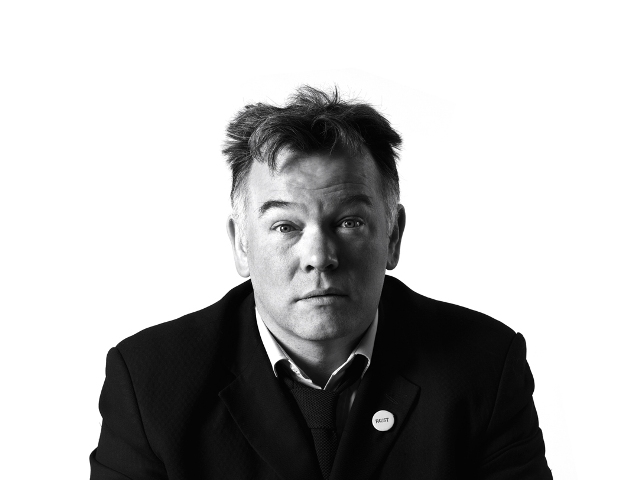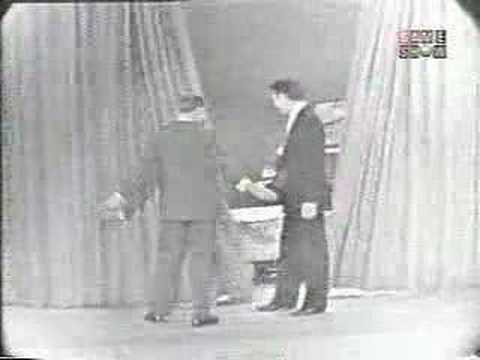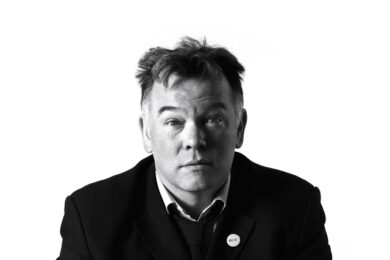In 1959, John Cage released an album on the Folkways label called Indeterminacy. As ever with Cage, the idea was deceptively self-explanatory and simple. He read out a series of stories about a whole bunch of stuff, from high to low subject matter, while his longtime collaborator David Tudor played improvised passages on piano in another room. The “indeterminacy” arose from the fact that Tudor could not hear Cage, nor he Tudor – the music was not designed to accompany the text, or vice versa and if they did chime in together, it was, necessarily, on an unconscious, unpremeditated basis.
Half a century later, and longtime improvisor, pianist and Cage expert Tania Chen struck on the idea of reviving Cage’s project. Beresford asked Stewart Lee, both a comedian and a fan of ultra-left field music including the improv scene, to do the readings. “I was always a massive fan, I loved Fist Of Fun, and, of course, his stand-up,” says Beresford. “I knew he’d have an angle on it, he wouldn’t ham it up or anything.”
This September, the trio continue their tour of the piece, with Alan Tomlinson on slide trombone. Lee himself is perhaps overly modest about his role in the proceedings. “I’ve been brought in rather in the way that Gavin Bryars brought in that tramp on Jesus Blood Never Failed Me Yet. I’m a resource. The only Cage piece I really knew was 4’33”. I wasn’t an expert and I’m still not. I tried not to find out about John Cage, so as to come to it clean. A lot of his strategies seem to be quite conceptualised, academic ways of approaching the unfamiliar. So actually being unfamiliar with his stuff I thought would be very helpful.
“I thought it would be a lot more serious – then Steve Beresford told me to look at Cage performing Water Walk on an American TV show back in 1950.
“Harry Hill actually performed it at the South Bank Centre, which he did, absolutely dead-on. Just like John Cage. So in some ways it did seem like Vic Reeves or Monty Python – Cage invites the audience to accept there’s some point in doing what he’s doing and then does it totally straight – which is what all the best comics do. It’s hilarious and beautiful.”
Cage’s performances, both of Water Walk and Indeterminacy invite two sorts of laughter – the sort of uncomprehending, Philistine scorn with which avant garde activity has so often been greeted on its interfaces with mass audiences, but also a genuine and intended joy at a performance which is intended to be as non-serious as it is serious.
“One of the liberating things about watching Cage on Water Walk is that he accepts the derisory laughter as a valid response to his work. I think that’s great,” says Lee. “I don’t believe he wasn’t aware at some level that the stories in Indeterminacy, when juxtaposed at random, wouldn’t produce comic effects. They’re a mixture of the pretentiously philosophical and the banally mundane. A disproportionate number of them have a lot to do with mushrooms – not the magic ones, just mushrooms.
“I think my involvement will bring in a lot of people with very little knowledge of John Cage who will go there and realise they have permission to laugh – not that I’ll be playing it for laughs. Cage’s instructions are ‘performance without expression’.”

The links and overlaps between comedy and avant garde/improv, supposedly a bastion of high seriousness are both manifold and strangely logical. Steve Beresford put together Vic Reeves’ house band; the late improv guitarist Derek Bailey, meanwhile, was a member of the Morecambe and Wise house band. “He was one of those musicians who used to hang around Soho, like labourers, looking for session work,” says Lee. “Derek Bailey got me into Chic Murray, a great Scottish music hall act from the 50s – Bailey said all the pit band musicians used to try to bunk off early to see him. You can see what they would have liked about him – it really swings. It’s like jazz, it’s all in the timing. Some of Bailey’s spoken word reminiscences sound a lot like John Shuttleworth – there’s this wonderful banal surrealism he gets.”
“Most great comedians are concerned with form,” says Beresford. “The Marx Brothers. Hellzapopin, remember that? Enormously formally innovative. And Jacques Tati – clearly, a huge influence on Vic & Bob, the farting Frenchmen. Also, the use of silence and reticence – so many things you could connect with Cage. The very obsessive, analytic nature of Stewart Lee’s comedy – his dissection of a postcard of two cats and dogs playing the piano. Or his take on Del Boy falling through the pub bar. Cage worked through things in the same obsessive way.”
Upcoming performances of Indeterminacy:
Sunday September 23, 7pm: Battersea Arts Centre
Lavender Hill, Battersea, London, SW11 5TN
Box Office: 020 7223 2223 or BAC.org.uk
Tickets: £10/ £8
Monday September 24, 8pm: Kings Place
90 York Way, London, N1 9AG
Box Office: 020 7520 1490 or www.kingsplace.co.uk
Tickets: £12.50
Tuesday September 25, 8pm: Café Oto
18-22 Ashwin Street, London, E8 3DL
Box office 020 7923 1231 or www.wegottickets.com
Tickets: £8/£10




